WODIN: helping migrant women get digitally and socially connected
WODIN is run by and for migrant women in Liverpool, supporting women with digital skills training as well as practical and emotional support.
WODIN is run by and for migrant women in Liverpool, supporting women with digital skills training as well as practical and emotional support.
Charity location
Focus
Grant size
CEO and Founder, Sylvia Kalungi, spoke to us about how WODIN started as a group of women meeting in their homes and has developed organically to meet the needs of hundreds of women in the community.
At Women and Digital Inclusion (WODIN) we help migrant women across Merseyside get digitally and socially connected. We support migrant women of all races but most of the people we serve are Black African migrants, because our founders come from the same background. We understand the challenges they're going through, because we have lived experience of them, and we know how to navigate those challenges and come through on the other side.
Liverpool is a settlement city with a high transient community of Black immigrants and asylum seekers. More than half are women, often single mothers, who have little access to digital resources. This leaves them excluded from the digital world and socially isolated. They either cannot work (due to waiting for asylum status) or end up in very low-paid work, and often do not have enough income to meet their basic needs. Our support helps them get connected, learn new skills that help them get better jobs, make new friends, and become more engaged in their communities and society as a whole.
WODIN started in 2016, with a small group of Black African migrant women sharing digital skills and supporting each other through challenges. We were meeting together in our homes, having food together, sharing ideas, and the group grew organically from that. We started a Facebook group and more and more people started joining us online. We were connecting with women across Liverpool, and beyond, who were going through similar challenges that we could support them through.
When the pandemic hit in 2020, we already had our community and our online groups. The pandemic created unique challenges for the migrant community and affected people in a major way. It triggered people back to the days when they were in detention centres and couldn't speak to anyone. All those memories came back to people. People were struggling with their mental health, and we were there to provide support and encouragement. They needed to be reminded that they weren’t back in that dark place.
During and after the pandemic, it became more important than ever to have digital skills – to get back into the job market, to stay connected with others, and to engage with essential services which went online. There was a woman who came to us who had gone for months without her prescription. She was in pain all day, every day, because she didn’t know how to order her medication online. Others were coming to us because they didn’t know how to use their phone, or they were getting scammed through phishing texts or calls.
We could see that there was an increasing need for digital skills, and we knew we could help. We ran digital skills training programmes for free because we knew that the people in our community that really needed it couldn't afford to pay. We also created a space where women could come with their young children, if necessary, as well as hosting events outside of working hours or online so mothers didn’t have to worry about finding or affording childcare. We always encourage women to not let life get in the way of their learning, and we will do what we can to support them in getting the training they need because it opens up so many opportunities. Learning digital skills helps people build confidence, skills, connections and independence. Many women use these skills to start their own businesses or progress in their careers and increase their income.
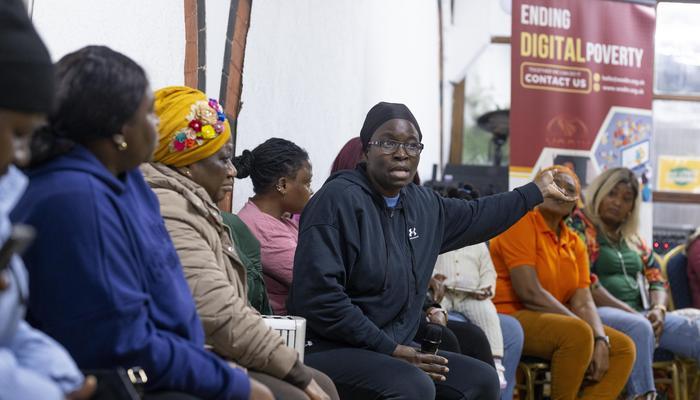
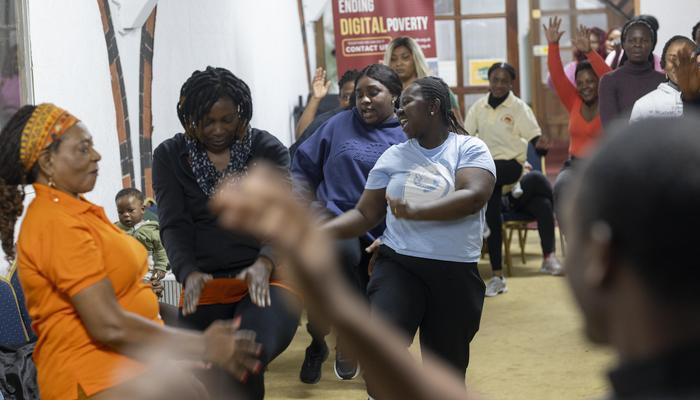
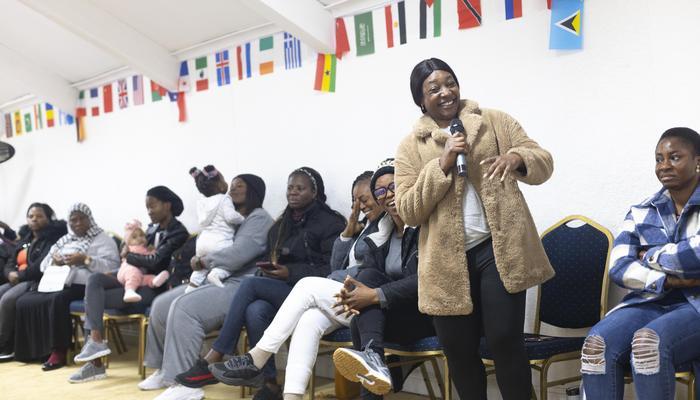
Digital skills training is our frontline offer, and it’s in our name, but it's not our main offer. We needed to get people onto the digital streets, as it were, but people come to us with much bigger challenges that we can support them with. Our projects have developed in direct response to the needs we are seeing in our community. Alongside our digital skills training programme, we offer advice and signposting, one-to-one support, befriending, welfare checks and practical subsistence support like cultural ethnic food parcels. We host a regular support group, Sisters Roundtable Conversations, where the women collectively choose a topic to discuss and share experiences and advice, as well as enjoying a meal together.
Many of the people that come to us have no recourse to public funds and they have been left to fall through the cracks because local statutory bodies are not serving them properly. Sometimes women come to our sessions, and we see that they’re shaking because they're hungry. When you dig deep, they tell you, “Well, I give the children the food, but I haven't had a meal in two days”. And it just breaks your heart. We are in a developed country. Why are people going hungry?
People have come to the UK for refuge, but they are shocked and traumatised by how they are treated. What is even more shocking is when you see the way other, non-Black, asylum seekers are treated. We saw the Government offer to pay people to take in Ukrainian refugees; hotels were opened up, people were welcomed red carpet style! Most of us could not believe this, because it is so different from our experiences. I don't begrudge them at all, because no one wants to leave their motherland/country because of war. But the difference in the treatment shows you that there is deep ingrained institutionalised and systemic racism. Where is the fairness? Where is the equity?
The asylum seekers we work with will always appreciate a bag of food because they are constantly trying to decide whether to eat or heat. It's one of the two. It's cold and they need to keep their children warm. But then, their children are hungry. So, they are always juggling in their head which to choose. So, when you give them that bag of food, they want to hug you.
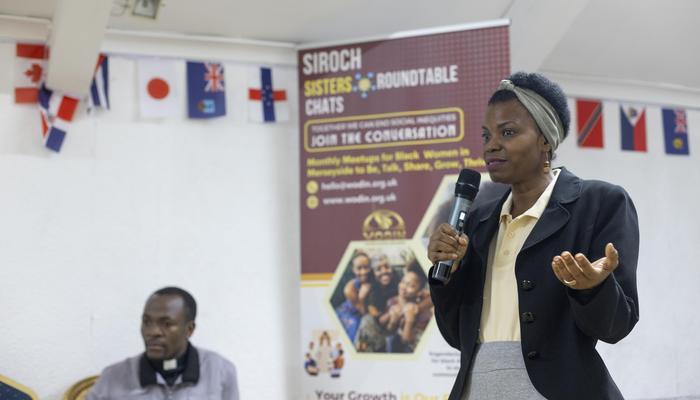
CEO and Founder, Sylvia Kalungi, speaking at a WODIN event.
We prepare food parcels with authentic African food like yams, cassava, plantain, sweet potatoes, gari, maize meal fufu, green bananas, jollof rice etc. Such are the foods that the people we serve know and love and are a welcome taste of home. When they receive the parcels, you should see the smiles on the kids’ faces, on the parents’ faces. They're so happy, and relieved that they don’t have to line up at a food bank for foods that they don’t like to eat.
This is our first year with Lloyds Bank Foundation and we were so excited to receive the funding. It's unrestricted, which means we can actually choose where we spend that money, and use it where it's most needed. The funding has really transformed the way we work. We are able to use the money to support some of the people we work with to get to our meetings by paying for their transport. We are able to provide a culturally appropriate meal, instead of just tea and biscuits. We now have a registered business office where we can run our training sessions from, and we can pay for Zoom so that people can watch replays if they miss a session. Our leadership team are able to go out to network and promote WODIN, as well as attend various learning opportunities, instead of perpetually looking for funding. Because of all this, more people are engaging with our services and we are able to serve our community better.
We’ve also received organisational development support from the Foundation. A consultant has been working with us for six months to help us finetune our values, our strategic objectives and where we want to focus moving forward. She’s helping us to put together a business plan and a development plan so that we can grow sustainably, as well as supporting us to communicate our story and demonstrate our impact more effectively.
Another consultant has been supporting us with our fundraising and how to craft better proposals. It's been a steep learning curve, but we have successfully attracted two more grants because of that support. We're excited about what we could achieve next year because we’ve now got some templates for writing funding applications, and we are much clearer on how to answer questions from funders, what to focus on and how to showcase our impact.
WODIN is a place one can rely on, a place loaded with all kinds of goodies, there is always something for everyone.
From the round table sessions to the food parcels, all the way up to the digital training sessions have all been awesome and amazing. WODIN is always up to something good.
- feedback from person supported by WODIN
I wanted to take a moment to express my heartfelt gratitude for the generous food package your group provided to my family recently. Your kindness and support during this challenging time have been invaluable.
The variety and quality of the food items in the package were greatly appreciated. Your thoughtfulness and dedication to helping those in need are genuinely commendable.
Your group’s commitment to making a positive difference in our community does not go unnoticed. I am sincerely thankful for your generosity and hope that your organization continues to thrive and make a meaningful impact in the lives of people.
- feedback from family supported by WODIN
The funding we received from the Foundation has been life changing. We felt like we were falling off a cliff and running out of funds, but we’ve been so encouraged by the support we’ve received and we’re excited about the future. We are currently focusing on improving our governance as a charity, because until recently we were a community interest company. Running a charity is completely different and so we are wrapping our heads around all that with the support of the Foundation.
We have also been going through our strategic operational plan to set our priorities for the year. We're clear on what we want to focus on for the next year and now we are able to go for it because we have the funding that we need. We have the essential funding to run our courses, we have the resources to support and train our volunteers, so now we have the capacity to develop and become more strategic in the ways that we serve our community.
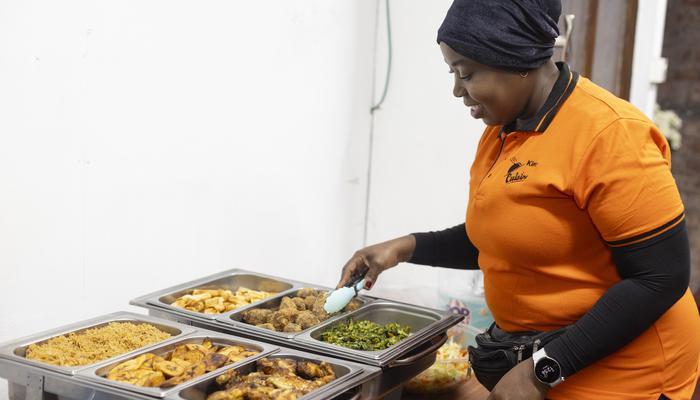
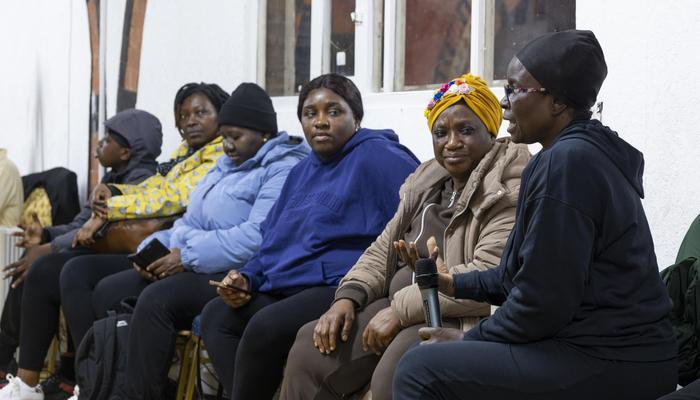
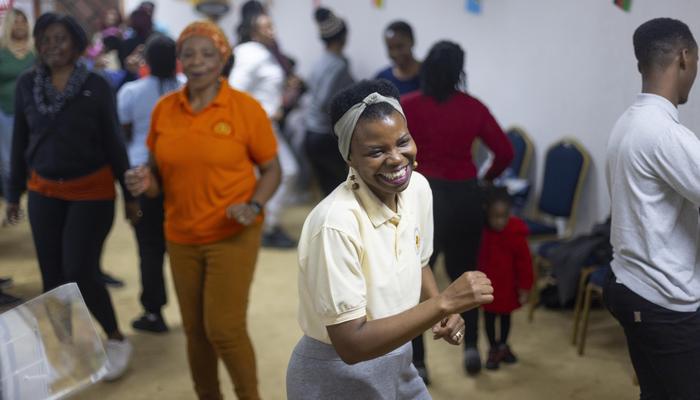
Find out more about WODIN by visiting their website: wodin.org.uk